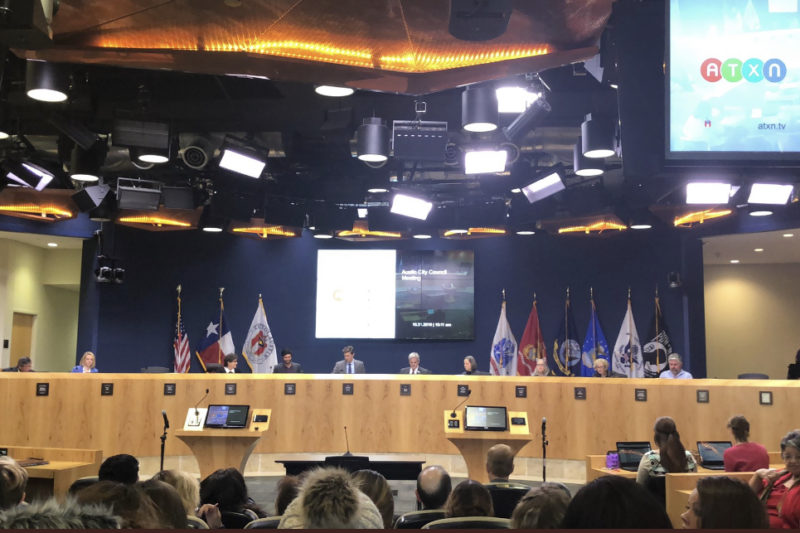Upcoming Austin Election Includes Proposal for “Strong Mayor” System
By Clark Dalton
Reporting Texas TV
AUSTIN, Texas — A proposition on the May 1 municipal election ballot seeks to change Austin’s city government to a “strong mayor” system, which would make the mayor Chief Executive Officer.
Proposition F is one of eight propositions for voters to decide May 1. Early voting started this week.
The mayor would have more responsibilities as CEO. The proposition would either reduce or remove powers currently assigned to the city manager, a position held by Spencer Cronk. Those job functions would shift to the mayor.
Mayor Steve Adler would receive veto powers, oversee the city budget, and appoint department heads.
Proposition F calls for a transfer of powers to Austin Mayor Steve Adler (left) from Austin City Manager Spencer Cronk. (Photos: austintexas.gov)
Brooke Shannon, a PhD candidate in government at the University of Texas, said there are positives and negatives in both systems.
“A pro for the city manager is that this person is appointed, they’re a career bureaucrat who’s not elected based on ideologies,” Shannon said.
“In situations where social issues are involved like the police protests this summer, a strong mayor would be more responsive than the city manager.”
Shannon said city manager positions were created in the 1890s at the beginning of the progressive era. Political corruption ran amuck in city halls during this period due to candidates putting their allies in positions of power. The city manager was introduced as a neutral party to make city governments run more smoothly and fairly.
However, things have changed in the century since. Big cities like Philadelphia, San Diego, and Chicago all have a variation of a strong mayor system. People who pushed for this proposition argue Austin should follow the same path.
Austinites for Progressive Reform brought the proposition to city hall with 24,000 signatures. One of the group’s co-founders, Andrew Allison, said there is more sense in having the people vote on the person who is calling the shots at city hall as a way of making the government more accountable to the people.
“Austin is one of few cities where the city manager is unelected, which is an odd system,” Allison said. “None of us would want a federal government where our right to vote for the president was taken away from us.”
He said the current system is not representative since many individuals do not have a direct say. This can make people less compelled to vote, reducing turnout.
The Austin chapter of the NAACP supports the measure. Chapter president Nelson Linder said passing this proposition will bring checks and balances to the city council, as well as increasing democracy for all.
The majority of the city council disagrees. Nine of the ten council members oppose Proposition F, with only District 8 Council Member Paige Ellis in support.
Councilman Greg Casar of District 4 wrote a blog post in which he explains his support for and against various initiatives on the May ballot. His opposition to Proposition F includes concerns about giving the mayor veto powers and creating a two-thirds override.

Nine of the 10 Austin City Council members oppose the measure, with Paige Ellis the only supporter. (Photo: Clark Dalton)
Austin for All People pinpointed this in its argument against the proposition.
“It’s a lot easier to get rid of a bad hire than it is to get rid of a rogue mayor,” said Nico Ramsey, the chairman for Austin for All People. “I can tell you when we forced a city manager to resign. What I can’t tell you is the last time we impeached a mayor.”
Ramsey said the 10-1 system is still relatively new, first implemented in 2012 with revisions in 2015. He and others with Austin for All People believe restructuring the current system to consolidate power for one executive office holder could make Austin’s government less representative, and is not a solution for increasing democratic involvement.
Another concern is political gridlock if the mayor no longer serves a potential tie-breaking vote for city council matters. Another item on the ballot, Proposition G is another item on the ballot, could resolve this problem by adding an 11th district city council member.
Brooke Shannon, the government graduate student, said making the city council larger could incorporate more representation in the city. She said it is important to craft smart policies whether these propositions pass May 1 or not.
“‘Strong mayor’ vs ‘weak mayor’ is a false dichotomy,” she said. “What we need to remember is if you like it today, you might not tomorrow.”
If Proposition F passes, the change would take place in 2023.
For more information, read KUT’s “7 Things to Know About Prof F.”

